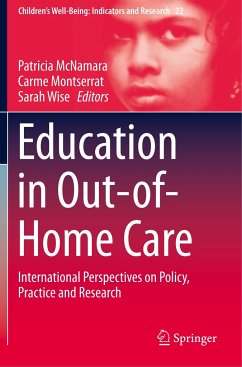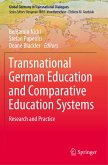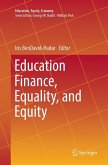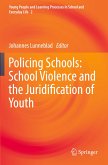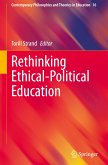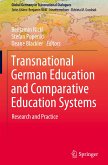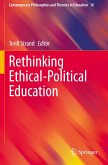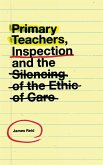Education in Out-of-Home Care
International Perspectives on Policy, Practice and Research
Herausgegeben:McNamara, Patricia; Montserrat, Carme; Wise, Sarah
Education in Out-of-Home Care
International Perspectives on Policy, Practice and Research
Herausgegeben:McNamara, Patricia; Montserrat, Carme; Wise, Sarah
- Broschiertes Buch
- Merkliste
- Auf die Merkliste
- Bewerten Bewerten
- Teilen
- Produkt teilen
- Produkterinnerung
- Produkterinnerung
This book draws together for the first time some of the most important international policy practice and research relating to education in out-of-home care. It addresses the knowledge gap around how good learning experiences can enrich and add enjoyment to the lives of children and young people as they grow and develop. Through its ecological-development lens it focuses sharply on the experience of learning from early childhood to tertiary education. It offers empirical insights and best practices examples of learning and caregiving contexts with children and young people in formal learning…mehr
Andere Kunden interessierten sich auch für
![Transnational German Education and Comparative Education Systems Transnational German Education and Comparative Education Systems]() Transnational German Education and Comparative Education Systems75,99 €
Transnational German Education and Comparative Education Systems75,99 €![Education Finance, Equality, and Equity Education Finance, Equality, and Equity]() Education Finance, Equality, and Equity75,99 €
Education Finance, Equality, and Equity75,99 €![Policing Schools: School Violence and the Juridification of Youth Policing Schools: School Violence and the Juridification of Youth]() Policing Schools: School Violence and the Juridification of Youth64,99 €
Policing Schools: School Violence and the Juridification of Youth64,99 €![Rethinking Ethical-Political Education Rethinking Ethical-Political Education]() Rethinking Ethical-Political Education75,99 €
Rethinking Ethical-Political Education75,99 €![Transnational German Education and Comparative Education Systems Transnational German Education and Comparative Education Systems]() Transnational German Education and Comparative Education Systems75,99 €
Transnational German Education and Comparative Education Systems75,99 €![Rethinking Ethical-Political Education Rethinking Ethical-Political Education]() Rethinking Ethical-Political Education75,99 €
Rethinking Ethical-Political Education75,99 €![Primary Teachers, Inspection and the Silencing of the Ethic of Care Primary Teachers, Inspection and the Silencing of the Ethic of Care]() James ReidPrimary Teachers, Inspection and the Silencing of the Ethic of Care124,99 €
James ReidPrimary Teachers, Inspection and the Silencing of the Ethic of Care124,99 €-
-
-
This book draws together for the first time some of the most important international policy practice and research relating to education in out-of-home care. It addresses the knowledge gap around how good learning experiences can enrich and add enjoyment to the lives of children and young people as they grow and develop. Through its ecological-development lens it focuses sharply on the experience of learning from early childhood to tertiary education. It offers empirical insights and best practices examples of learning and caregiving contexts with children and young people in formal learning settings, at home and in the community. This book is highly relevant for education and training programs in pedagogy, psychology, social work, youth work, residential care, foster care and kinship care along with early childhood, primary, secondary and tertiary education courses.
Produktdetails
- Produktdetails
- Children's Well-Being: Indicators and Research 22
- Verlag: Springer / Springer International Publishing / Springer, Berlin
- Artikelnr. des Verlages: 978-3-030-26374-4
- 1st edition 2019
- Seitenzahl: 316
- Erscheinungstermin: 20. November 2020
- Englisch
- Abmessung: 235mm x 155mm x 17mm
- Gewicht: 548g
- ISBN-13: 9783030263744
- ISBN-10: 3030263746
- Artikelnr.: 60439008
- Herstellerkennzeichnung Die Herstellerinformationen sind derzeit nicht verfügbar.
- Children's Well-Being: Indicators and Research 22
- Verlag: Springer / Springer International Publishing / Springer, Berlin
- Artikelnr. des Verlages: 978-3-030-26374-4
- 1st edition 2019
- Seitenzahl: 316
- Erscheinungstermin: 20. November 2020
- Englisch
- Abmessung: 235mm x 155mm x 17mm
- Gewicht: 548g
- ISBN-13: 9783030263744
- ISBN-10: 3030263746
- Artikelnr.: 60439008
- Herstellerkennzeichnung Die Herstellerinformationen sind derzeit nicht verfügbar.
Patricia McNamara is an Australian academic, qualified in education, social work and family therapy. Her extensive practice career encompassed secondary teaching as well as early childhood, primary and secondary school social work. Patricia also worked as a university student counsellor and in child and family mental health. She then undertook doctoral and post-doctoral studies, completing a longitudinal study of adolescent residential treatment. That research had a strong focus on the education experience outcomes of young people living with mental health issues. Patricia has since worked for almost twenty years as a teaching and research academic in social work. Her current research interests include education in out-of-home care and therapeutic approaches to residential and foster care. Together with colleagues from La Trobe University she recently completed a funded scoping of education outcomes of care leavers across Australia. She is currently a Senior Fellow (Hon) in the Department of Social Work at the University of Melbourne where she is engaged in research and postgraduate education. Carme Montserrat is an academic qualified in education and social psychology. She has worked in the education and welfare systems in Barcelona (Spain) and as a consultant with the Council of Europe. From 2006 she has been teaching in the degrees of Psychology and Social Education at the University of Girona (Spain) and in Masters and Doctoral programs. She is member of the Research Team on Childhood, Adolescence, Children's rights and their Quality of Life within the Research Institute on Quality of Life (IRQV) at the University. Her main areas of research are related to vulnerable children and young people and their well-being. Carme is focused on several domains including education of children in out-of-home care. She participated in the European project known as YIPPEE, which had a strong impact on sector awareness and knowledge about the education outcomesof care leavers. Her current research projects, both at national and cross-national levels, include education and wellbeing approaches to children in foster families (kinship and stranger) and residential homes. Sarah Wise is an Australian developmental researcher with many years of research, policy and service innovation experience covering a wide range of issues relating to children, parents and families. Her special interest areas are early childhood development, out-of-home care, local area responses and the development of social policy and practice with evidence. Sarah completed her PhD through the Departments of Psychology and Paediatrics at the University of Melbourne on the topic of attachment and wellbeing among foster care children. Sarah has held senior research positions within a Commonwealth Government Statutory Authority and in the not-for-profit child and family welfare sector. Sarah's research has influenced policy and practice decision-making within the child and family service system. It has been directly linked to program innovation and new resources to improve the educational outcomes of children and young people in foster care and residential care. Sarah is currently employed as a Senior Researcher at the University of Melbourne, Department of Social Work.
Part 1. Quantitative evidence.- Chapter 1. Linking children's education in care with their subjective well-being - Spanish quantitative data (Montserrat).- Chapter 2. US overview of education outcomes (Pecora).- Chapter 3. UK matching of education and OHC datasets (Kendrick).- Chapter 4. Overview of Australian evidence (Harvey).- Part 2. Early childhood education.- Chapter 5. First 1000 Days (TBD).- Chapter 6. Educational Progress of Looked-After Children in England: A Study Using Group Trajectory Analysis (Melhuish).- Chapter 7. High-quality early childhood education and care can help address education inequality (Wise).- Chapter 8. School readiness (Lipscombe).- Part 3. Primary years.- Chapter 9. Canadian school outcomes (Flynn).- Chapter 10. Optimising opportunities for good learning outcomes in Australia (McNamara).- Chapter 11. Pilot support program in London (Cameron).- Chapter 12. Overview of policy and practice in Hong Kong (Cuhk).- Part 4. Secondary school.- Chapter 13. Educational residential care (Melkam).- Chapter 14. European project with data from Germany, France, Austria, Croatia and Spain (Monserrat).- Chapter 15. Education outcomes from foster care in Eire (Gilligan).- Chapter 16. Raising Expectations program -supported transition to tertiary education in Victoria, Australia (Uni).- Part 5. Tertiary education.- Chapter 17. Down snakes and up ladders to tertiary education (Matheson).- Chapter 18. Care leavers given voice by researchers with lived experience (Jursyzn).- Chapter 19. Transitioning to higher education in the Netherlands (Grietens).- Chapter 20. California college transition (Courtney).
Part 1. Quantitative evidence.- Chapter 1. Linking children's education in care with their subjective well-being - Spanish quantitative data (Montserrat).- Chapter 2. US overview of education outcomes (Pecora).- Chapter 3. UK matching of education and OHC datasets (Kendrick).- Chapter 4. Overview of Australian evidence (Harvey).- Part 2. Early childhood education.- Chapter 5. First 1000 Days (TBD).- Chapter 6. Educational Progress of Looked-After Children in England: A Study Using Group Trajectory Analysis (Melhuish).- Chapter 7. High-quality early childhood education and care can help address education inequality (Wise).- Chapter 8. School readiness (Lipscombe).- Part 3. Primary years.- Chapter 9. Canadian school outcomes (Flynn).- Chapter 10. Optimising opportunities for good learning outcomes in Australia (McNamara).- Chapter 11. Pilot support program in London (Cameron).- Chapter 12. Overview of policy and practice in Hong Kong (Cuhk).- Part 4. Secondary school.- Chapter 13. Educational residential care (Melkam).- Chapter 14. European project with data from Germany, France, Austria, Croatia and Spain (Monserrat).- Chapter 15. Education outcomes from foster care in Eire (Gilligan).- Chapter 16. Raising Expectations program -supported transition to tertiary education in Victoria, Australia (Uni).- Part 5. Tertiary education.- Chapter 17. Down snakes and up ladders to tertiary education (Matheson).- Chapter 18. Care leavers given voice by researchers with lived experience (Jursyzn).- Chapter 19. Transitioning to higher education in the Netherlands (Grietens).- Chapter 20. California college transition (Courtney).

